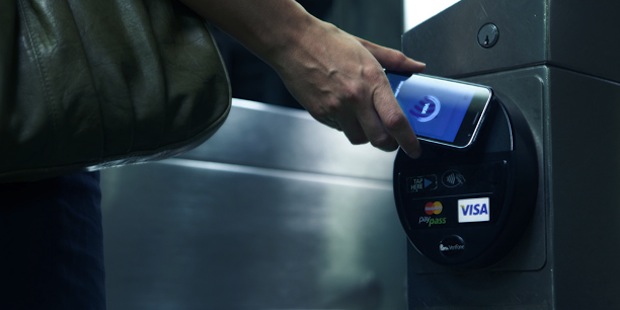While Near Field Communication is an intriguing innovation, it is important to understand its advantages and disadvantages of it before integrating this device into an individual's life or into a business. Before we continue it's important to note, opinions about technology is often suggestive because technology is used differently by people who want to perform different functions.Therefore, consider the following with a grain of salt.
Advantages of NFC:
- Convenience
- Many consumers will "pay" for convenience because convenience is very important in today's society. NFC is a perfect source of convience because it merges a mobile device with wallet(s). NFC is also quite intuitive; all it takes is a simple touch when using NFC for payments. Can you imagine how much faster line ups would be at the grocery store, coffee shop, etc?
- NFC can be well adapted for all kinds of situations ranging from bank cards to transit passes, movie passes, reward systems and even keys. Ideally, NFC is suited for a broad range of industries and uses because this innovation allows users to manipulate through the development of softwares.
- Now, you might think how could fusing your wallet into your mobile device be safer. After all, just like a wallet, a cellphone could be stolen. However when your wallet is stolen, the thief has access to all your credit cards and information right away! With smartphones, passwords can be used to further protect your information.
- NFC enabled credit cards are much more secure than a credit card magnetic strip
- Requires PIN
- Retailers no longer have physical access to your credit card information
Disadvantages of NFC:
- Many of us who would like to try out NFC wishes that it can be used everywhere and anywhere. However if companies do not agree to integrate NFC into their business, consumers will not be able to use the technology. NFC users will not be able to use reward/point card system at their favorite coffee shop, make-up department or at any other retailer.
- Another major risk to NFC is computer hacking or phone hacking. As mobile phones become more developed, they become much like a hand held computer, and as with computers, they become prone to viruses. Hackers will want to gain access to these tiny computers because it contains a lot of important information all in one device.
- Examples include a phone’s owner credit card information, bill payments,social security information, etc. Moreover, as technology advances, it will becomes easier for hackers to do this.
- It is estimated that most governments could take up to 10 years to finally warm up to Near Field Communication technology.
NFC and Businesses

In order for us to be able to even have NFC devices in society, both consumers and providers (businesses) have to agree and enjoy this innovation. Listed above were pros and cons mostly towards customers. Here we will list and explain pros and cons for companies! NFC may be a great addition to your business!
Pros for Business:
- As said above, NFC is quite versatile and it can be well adapted into many types of businesses. Versatility creates many different ways for NFC to be used within one business. NFC is not only used for payments, but it can also be used for ticket scanning, train passes and much more.
- NFC allows for a faster and a more efficient way of getting out of the check out-line.
- Overall, it improves efficiency and productivity.
- A great example of this is Starbucks. Who recently invested $25 million in NFC enabled machines to shorten the waiting periods for customers. This is beneficial for companies because they can generate more revenue and potentially attract more customers.
- Evidently, Near Field Communication provides a competitive advantage.
- Customers are able to keep track of reward systems.
- They're are now up to date in the palm of your hand. For example, Starbucks reward points, or Air Miles.
- NFC can also be used for staff communication in a work place. For example, you wave your smartphone to signal to your boss that you're going on a lunch break.
Cons for Business:
- Costly
- NFC is an expensive technology and smaller companies may not want to risk investing in NFC because it is hard to measure the additional profit with NFC.
- When choosing to incorporate NFC enabled machines, retailers must make decisions for using NFC devices as a form of payment.
- Decisions may include software and hardware development which can be very costly. Also which manufacturer to purchase from, how many should be purchased, and who can help install? Are all related with a high cost.
- It might be costly for businesses to change the way they run their company, for example hiring NFC technicians and additional customer service to handle these "tap & go" transactions.
- The cost would vary depending on the size of company and the size of integration. But for reference, Starbucks invested $25 million in 2011 alone
- According to Wired Magazine, by 2016 only 1/4 of Americans will have NFC smartphones. Unfortunately this is not enough incentive for most businesses to incorporate NFC.
- Retailers without NFC enabled devices are at a disadvantage compared to those who have integrated enabled devices
- Evidently, this drives consumers towards businesses that provide the convenience of using a wireless wallet.



